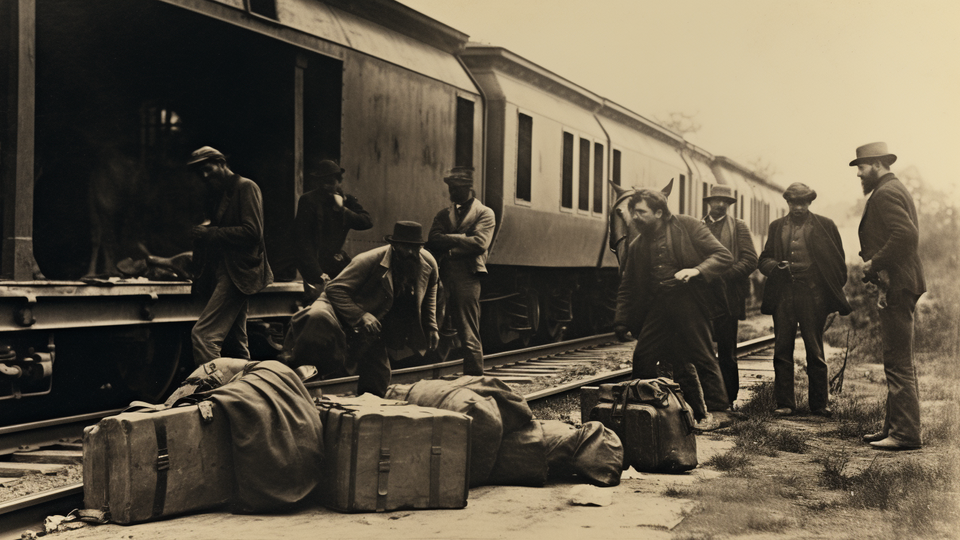Paranoia and Diversity of Thought in South Carolina

November 1860, as news of Abraham Lincoln's election was spreading and South Carolina was preparing to secede, was just about the worst time for a Bostonian to visit the Palmetto State, as William C. Wood learned the hard way.
As Wood noted in his letter to abolitionist William Lloyd Garrison's newspaper The Liberator, the decision to send him packing was rendered at the same courthouse where, in 1844, Samuel Hoar had been expelled. That incident, and the fierce Northern reaction to it, is related in Susan-Mary Grant's North Over South: Northern Nationalism and American Identity in the Antebellum Era:
Throughout the 1830s and 1840s, events conspired to persuade a growing number of northerners that the South was not merely an affront to national pride but also a direct and growing threat to the northern states. The expulsion from South Carolina of Massachusetts' emissary Samuel Hoar – who had gone to Charleston to protest the fact that northern African American seamen were routinely imprisoned there while there ships were in dock – provoked intense outrage in Massachusetts and prompted the state senate to inquire hotly whether the "Constitution of the United States [has] the least practical validity or binding force in South Carolina, excepting where she thinks its operation favorable to her? ... Are the other States of the Union to be regarded as the conquered provinces of South Carolina?" Ralph Waldo Emerson was equally angered by what he saw as South Carolina's high-handedness, but he was opposed to retaliation. This, he felt, would only bring New England down to South Carolina's level, something he could not envisage. New England culture, Emerson declared, "is not so low. Ours is not a brutal people, but intellectual and mild. Our land is not a jail." In the future, Emerson concluded, northerners should go to South Carolina "in disguise and with pistols in our pockets, leaving our pocketbooks at home, making our wills before we go."
Clearly Wood either hadn't read Emerson's advice or deemed it hyberbolic. Grant continues:
[Emerson] saw the whole event [of Hoar's expulsion] as typical, and it offered further proof that North and South were separated by more than slavery. "It is the inevitable effect of culture to dissolve the animal ties of brute strength, to insulate, to make a country of men; not one strong officer, but a thousand strong men. ... In all South Carolina there is but one opinion, but one man – Mr. [John C.] Calhoun. Its citizens are but little Calhouns. In Massachusetts there are many opinions, many men."
This was not entirely true. While Calhoun's opinions certainly dominated, South Carolina politics included both figures more radical on state rights than he (most notably Robert Barnwell Rhett) and staunch Unionists like James L. Petrigru, under whom Rhett studied as a youth a Beaufort College and formed a 50-year attachment despite their political differences.
Other unionists included lawyer Daniel Huger, who worked with Petigru "to rally tidewater Unionists during the nullification crisis," according to Eric H. Walther, and even a young William Lowndes Yancey, who would later become a rabid secessionist after moving to Alabama. Walther writes that Yancey's "new legal mentor in Greenville, Benjamin F. Perry, ranked as the leading upcountry unionist. Robert Cunningham served as a division officer of one of the dozens of Washington Societies, paramilitary units formed to challenge nullifiers and backed tacitly by President [Andrew] Jackson."
Petigru was still an unrepetant Unionist by the time South Carolina seceded. Christopher Dickey writes that in 1861,
even the paterfamilias of South Carolina's legal and political elite was on the defensive as the state became, in Petrigru's famous phrase, a "lunatic asylum."
Petrigu, born in 1789, died in March 1863, shortly after [British consul Robert] Bunch departed and long before the Civil War ended, but certainly not before he could see where it was leading. "It is an odd feeling to be in the midst of joy and congratulations that one does not feel," he said soon after the fighting started. "On the contrary, it is a feeling of deep sadness that settles on my mind. The universal applause that waits on secessionists and secession has not the slightest tendency to shake my conviction that we are on the road to ruin." When the war was well over, and all was lost, his friend the poet William Grayson wrote a verse dedicated to Petigru that conceded, more with affection than with bitterness, that Petigru had been right from the beginning to listen to his intellect and not to the clamor of public opinion:
'Tis for this we render honor –
That he ranks among the few
Who, amid a reign of Error,
Dared sublimely to be true.
See you next post. If you'd like to get these delivered to your inbox (for free), hit the subscribe button and enter your email address. You may need to check your spam folder for the confirmation email, but I'll never spam you or share your address. You'll just get these posts with the video embedded. (If you use Gmail, you may need to drag the first regular email from your Promotions folder to your inbox, but then you should be good to go.)
